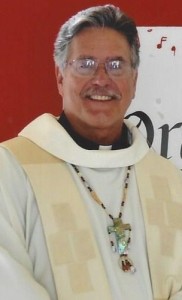Sunday’s Readings: Deuteronomy 4:1-2, 6-8; Psalms 15:2-3, 3-4, 4-5; James 1:17-18, 21b-22, 27; Mark 7:1-8, 14-15, 21-23
…From Your Pastor’s Desk
Labor Day: Monday, September 2, 2024
In 1981 Pope [Now Saint] John Paul II wrote Laborem Exercens (On Human Work). In it he affirmed that “The Church considers it her task always to call attention to the dignity and rights of those who work, to condemn situations in which that dignity and those rights are violated. And to help to guide (necessary) changes so as to ensure authentic progress by man and society.” He thought highly of the dignity of human labor (work). But not all do.
- Work – some put in endless hours to avoid it. They work hard at not-working.
- Work – some can’t get enough of it and must be busy all the time; multi-tasking is their norm.
- Work – it does a body good.
God worked. God created the earth and then God rested. But that doesn’t mean the earth project was finished – far from it.
In the creation stories, God made human beings, in a manner of speaking, “co-creators to fashion this world and to make it reflect God’s goodness and love. Adam and Eve were to tend the Garden of Eden. They were, in a sense, to fashion and finish God’s work. Well, that was the plan.
But sin entered in. Because of original sin, people put themselves ahead of God, people thought of themselves before others, people often saw others as a threat to their own welfare. People saw work as drudgery to be avoided rather than as a share in God’s work of creation. They were more interested accumulating things and in money than in creating.
Labor Day reminds us of the dignity of all work. It reminds us that we are called to offer all work to the Lord. And it reminds us of the dignity of each human being. All are created in the image of God. All are called to work together to build up a world of justice, peace, respect, and love. We believe that we are called to work together for a just economy in which all people of the world share in all things which the Lord has created for us all. We still have a lot of work to do; this world is far from finished. Let’s get to it! Works for me! ?
PS: Yes, we will have the 9am Mass on Labor Day
History is not the past; it is the present looking at the past. By placing the Pharisees before our eyes in so many readings the Liturgy today is clearly calling us to see ourselves in them.
Like them, we know that it is much easier to deal with outer, visible things than with the inner world of attitudes: with the heart. And so, like them, we might tend to evaluate ourselves and others in purely external ways: the number of prayers we recite, the amount of money we give, etc. There is nothing wrong with external things, but there is also an inner world that shapes and gives meaning to the external.
If we make religion a ‘business’ we turn the inner spirit into an external ‘thing’. The German philosopher, Hegel, one of the most influential thinkers of the 19th century, wrote: “The Holy as a mere thing has the character of externality; thus, it is capable of being taken possession of by another to my exclusion; it may come into an alien hand, since the process of appropriating it is not one that takes place in the Spirit…. The highest of human blessings is thus thought to be in the hands of others.”
This was not written about the historical Pharisees, but about Christians who developed a similar attitude to theirs. It is difficult to retain a clear vision of the Gospel: that “God is Spirit, and those who worship Him should worship in spirit and in truth (John 4:24)”. We are forever in danger of stepping into the shoes of the Pharisees, not the Carpenter.
What the Pharisees lacked in spectacular fashion was any kind of interiority or depth; their minds were turned outwards, to rules and casuistry. To clever, but unsound reasoning.
What matters, Jesus said, is not what goes into a person from the outside, but what comes out from the inside. Religion is not about things; it is about you! It is about the kind of response you make to the world, to others, and to God. It is about whether that wonderful ‘chemistry’ of the Gospel is happening in you: the kind of ‘chemistry’ that can turn bad stuff into good, curses into blessings, suffering into prayer.
The Spirit of faith is hard to always keep in sight, yet it is meant for all times. It is the most sublime Wisdom, yet it is meant to be very practical and not just a philosophy, a way of thinking. One way to make these ends meet is to not only identify religion with visible practices. This is what the Pharisees and others did in the time of Jesus, and it is a constant temptation for ourselves.
Father Ron

